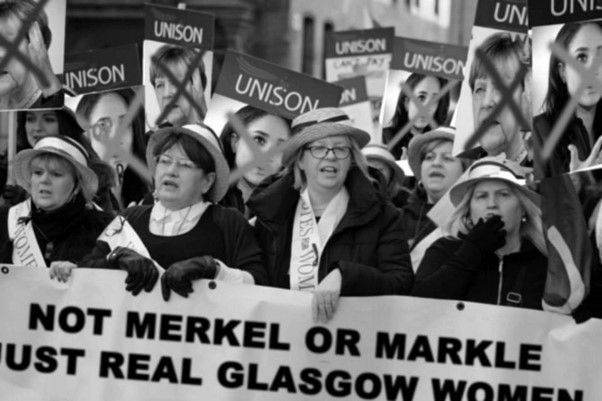This article belongs to the Women and Workplace Struggles: Scotland 1900-2022 collection.

Context
The 1970 Equal Pay Act prohibited less favourable treatment between men and women in terms of pay and conditions of employment. In 2020 the pay gap in the UK was 15.5%, meaning on average women were paid 84.5p for every £1 men earned. (ONS, 2020). In 2006 Glasgow City Council (GCC) introduced a Workforce Pay and Benefits Review (WPBR) and Job Evaluation Scheme (JES), the aim of which was to address gender pay inequality.
Listen to Kathleen, a Glasgow City Council UNISON Steward, speak about her experience of industrial action over 20 years
2007-2018 Women’s Equal Fight in Glasgow City Council
As early as 2007, women in Glasgow began to challenge the outcome of the 2006 WPBR which saw traditionally female-dominated jobs, such as catering and cleaning, paid less than traditionally male-dominated jobs such as refuge collection. A long running battle ensued in which the women had to fight, not just GCC but their trade unions, GMB, UNISON and UNITE. The unions were reluctant to enter a dispute they were not confident of winning, but the women were determined to fight. Spurred on by the injustice and inequality, a group of women sought the support of private solicitors, Action for Equality (AFE) and Stefan Cross QC. By 2017, the success of this group led GMB and UNISON to join forces with them.
What followed was a textbook lesson on how trade unions can organise and through that process build the confidence, self-esteem and self-belief of their members.
The campaign was long, fun and highly visible. It built solidarity across a disparate workforce with a common experience of injustice and succeeded in politicising many of them.
10th February 2018 marking the centenary of women winning the right to vote Glasgow women march for the right to equal pay
"Women Suffragettes 20th Century and we are still fighting for equality”
By 2018 the intransigence of GCC led to one of the most successful strikes in modern history. In October 2018 GGC’s, predominantly female low paid workforce, took two days all-out strike action which almost brought the whole city to a halt.
These workers kept vital services going, and without them other workers were impacted. With no domestics, catering assistants and support for learning assistants, schools and nurseries could not open. Without home carers, families had to step in to care for loved ones. The disruption this strike caused to lives in Glasgow did not lead to a backlash against the strikers, quite the opposite. The well-organised public campaigning of these women ensured they had the support of Glaswegians across the city.
Before the two days were finished the council agreed to settle the equal pay claims and to implementing a new JES to address the inequalities going forward.
Settlement of equal pay claims
This process was not straightforward, with every worker needing to complete paperwork in order that a calculation could be made of what they individually were due.
Unison set up drop-in sessions, to assist members to complete the paperwork needed to calculate what each individual was due in term of back pay.
This process allowed an insight into the lives of the strikers and the impact the back pay payment would have on their lives.
“One member asked us if we could read her paperwork for her, as she was finding it difficult. She told us she knew the amount she was due, she stated the amount and asked us to check.
When we checked, the actual amount was ten times the amount she had quoted.
She was in shock and said, “good I can leave him now.”
This woman had suffered domestic violence for many years and with this money she could start a new life.”
(Letitia McGowan, UNISON steward, 2021)
Post-strike job evaluation (JE)
Trade unions and the employer endorsed an appropriate JE scheme, and a joint JE team, consisting of GCC staff, trade union representatives from Unison, Unite and GMB, was established in June 2019. Extensive training was undertaken by the team and the aim was to complete the JE process by March 2021.
The JE process went live in early 2020 just before the COVID-19 pandemic hit. As JE involves face-to-face interviews, everything had to stop immediately. In 2021 the team regrouped and has now been trained in conducting interviews online using Microsoft Teams whilst ensuring no one is discriminated against and COVID-19 restrictions are accommodated.
[query over timeline here?]
At time of writing, Summer 2021, there is no deadline for completion of the JE process. Until this process is complete and a new pay grading scheme is introduced, the workforce will continue to suffer discrimination. Equal Pay compensation has only been paid up to 31 March 2018, staff will have to be compensated from 2018 until the date the JE process is complete and staff are paid at the appropriate rate for the job as determined by the JE process.
Equal pay march, 29 March 2018
Listen to Sylvia discuss how she felt during the March and how she feels now when the JE process has stalled.
"Solidarity, strength and power" 29 March 2018
The significance of the Glasgow equal pay strike
The Glasgow Equal Pay campaign is a textbook lesson on how trade unions can organise and through that process build confidence, self-esteem and self-belief of their members. Through this campaign the women, their families and the citizens of Glasgow learned the value of solidarity and of trade unions.




Rate and Review
Rate this article
Review this article
Log into OpenLearn to leave reviews and join in the conversation.
Article reviews